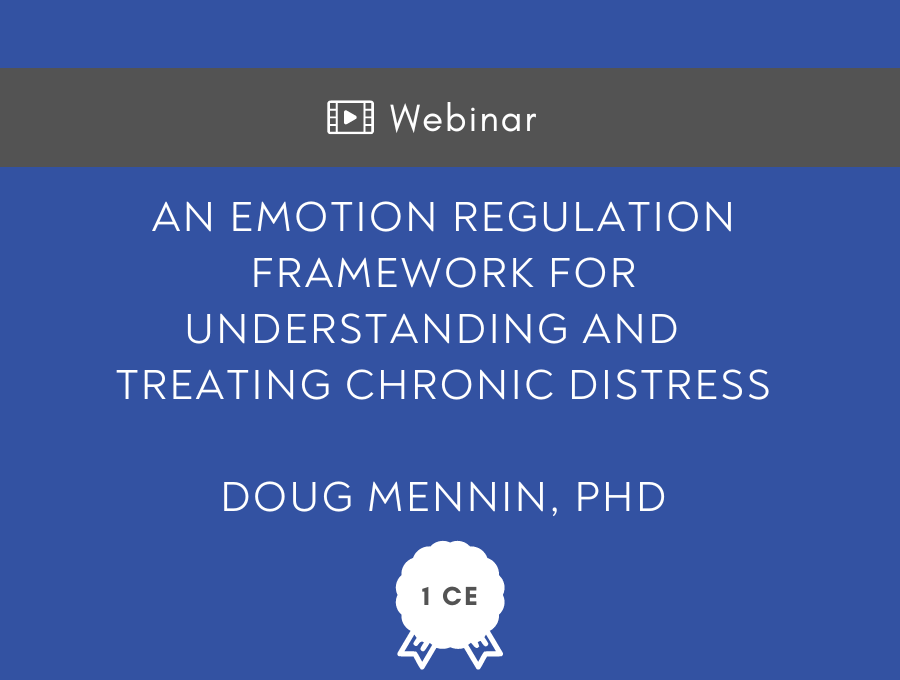
An emotion regulation framework for understanding and treating chronic distress – 1 CE Hour
About Course
Humans are especially adept at seeing problems in the future and trying to figure out how to fix them and looking into our past to see what went wrong in order to make better choices. The gift of humanity is in our ability to see where we've come from and what we can take from that experience to apply it to what may come and improve our standing. But, this gift can also be a curse. These tools can become traps. Worrying. Ruminating. Criticizing. Emotion regulation therapy (ERT) is a theoretically-derived, evidence-based, treatment that integrates principles from traditional and contemporary behavioral, meditative, and experiential treatments with basic and translational findings from affect science to offer a blueprint for improving intervention for individuals with chronic distress.Description
Humans are especially adept at seeing problems in the future and trying to figure out how to fix them and looking into our past to see what went wrong in order to make better choices. The gift of humanity is in our ability to see where we’ve come from and what we can take from that experience to apply it to what may come and improve our standing. But, this gift can also be a curse. These tools can become traps. Worrying. Ruminating. Criticizing.
Emotion regulation therapy (ERT) is a theoretically-derived, evidence-based, treatment that integrates principles from traditional and contemporary behavioral, meditative, and experiential treatments with basic and translational findings from affect science to offer a blueprint for improving intervention for individuals with chronic distress.
Webinar recorded on December 14, 2019.
Learning Objectives
- Discuss the challenges in understanding and treating conditions characterized by chronic distress
- Describe how an affect science based unifying framework can improve understanding and treatment
- Evaluate the efficacy and proposed targeted mechanisms of an emotion regulation therapy (ERT) that utilizes this framework
About the Presenter
Doug Mennin, PhD, is a Professor of Clinical Psychology at Teachers College, Columbia University. His work is focused on the diagnosis, assessment, and treatment of mood and anxiety He has published over 115 articles, chapters, and books, and often speaks to the media about how to help people better understand and respond to their struggles with anxiety, worry, and depression. He currently serves on the editorial board of six journals and on the executive boards of the APA Division of Clinical Psychology and the Society for a Science of Clinical Psychology. He is also the Chair of the Scientific Council of the Anxiety and Depression Association of America (ADAA).
Continuing Education
American Psychological Association
The Center for Prolonged Grief at Columbia School of Social Work is approved by the American Psychological Association to sponsor continuing education for psychologists. The Center for Prolonged Grief maintains responsibility for this program and its content.
Note: Many state boards recognize the APA approval. Please check with your state licensing board.
New York State Education Department
- NYSED State Board for Psychology recognizes the Center for Prolonged Grief as an approved provider of continuing education for licensed psychologists (#PSY-0150).
- NYSED Board for Social Work recognizes the Center for Prolonged as an approved provider of continuing education for licensed social workers (#SW‐0727).
- NYSED State Board for Mental Health Practitioners recognizes the Center for Prolonged Grief as an approved provider of continuing education for licensed marriage and family therapists (#MFT-0080).
Note: Non-NYS social workers, marriage and family therapists, and other professionals, please check with your state licensing board. Many states have recognized our continuing education programs as we are at a CSWE-accredited institution and part of a regionally accredited university.
Course Content
An emotion regulation framework for understanding and treating chronic distress
-
Watch the webinar
00:00 -
Take the post-test
-
Post-webinar evaluation
00:00
About the instructors
34 Courses
346 students
8 Courses
0 students
